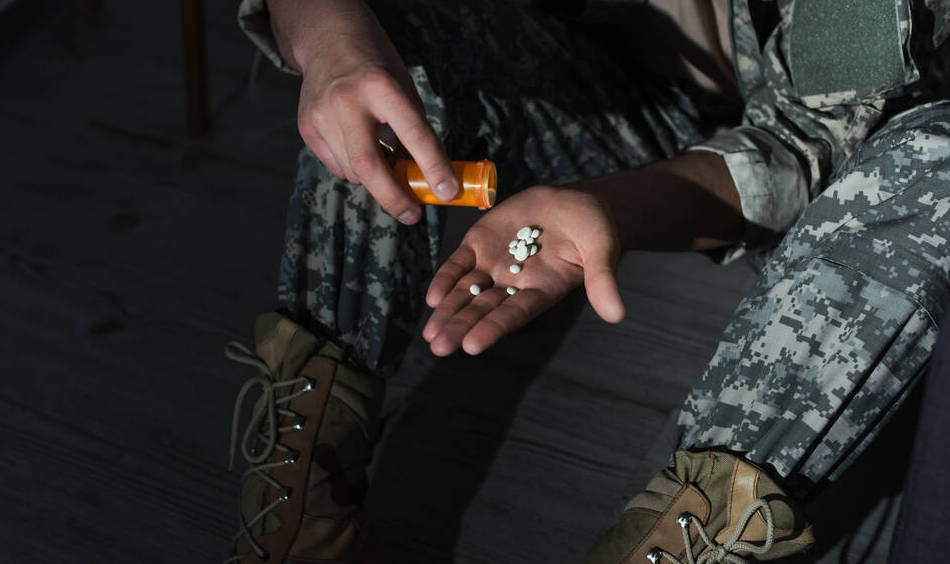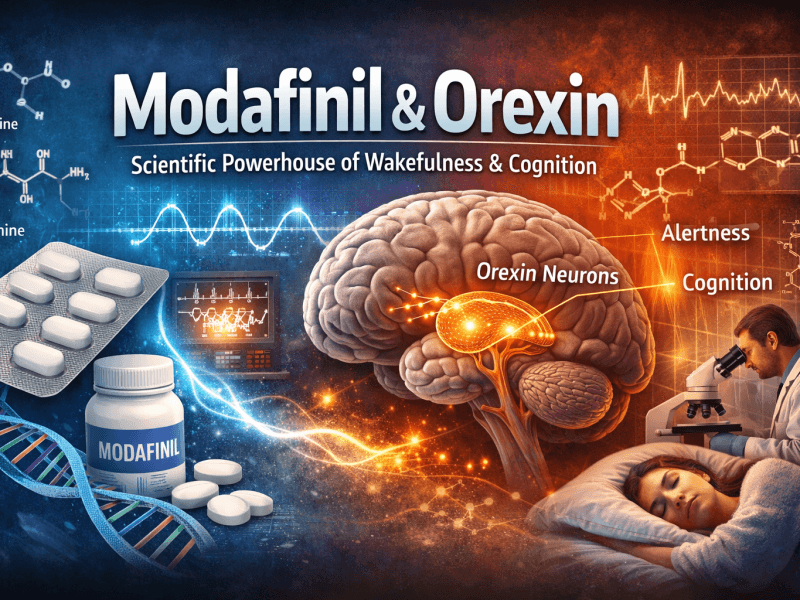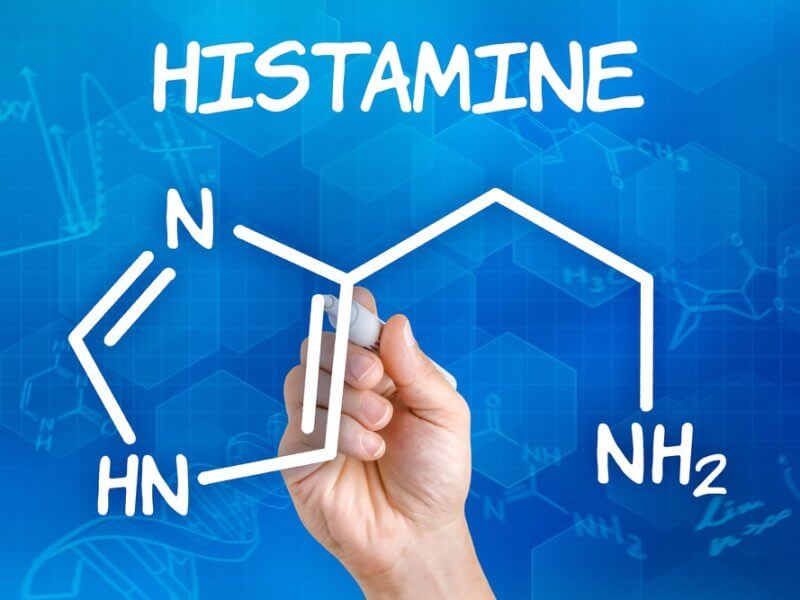Last Updated on 11/02/2026 by James Anderson
The Imperative for Sustained Cognition in Modern Warfare
The character of contemporary conflict has shifted. Military operations are no longer defined solely by physical strength or tactical maneuver, but increasingly by information dominance, split-second decision-making, and sustained cognitive endurance. Whether piloting a multi-role fighter for a 40-hour mission, commanding a special reconnaissance team deep behind enemy lines, or analyzing real-time drone feeds, the modern warfighter’s primary weapon is the brain.
Sleep deprivation is the adversary that never rests. It degrades situational awareness, slows reaction time, impairs moral reasoning, and erodes the very judgment that separates combat effectiveness from catastrophic error. To counter this, military science has long sought a pharmacological solution one that provides operational alertness without the significant drawbacks of traditional stimulants.
Modafinil (Provigil) , a eugeroic (wakefulness-promoting agent) developed for narcolepsy, has emerged over the past two decades as the leading candidate. It is not a mythical “Limitless pill,” but it is a potent, evidence-based tool now integrated into the pharmacopoeias of several leading global militaries. This review provides a comprehensive, expert analysis of Modafinil’s military applications, dissecting its neuropharmacology, comparing it against legacy compounds, evaluating real-world performance data, and navigating the complex ethical and legal terrain it occupies.
Pharmacological Rationale: Why Modafinil Suits the Military Profile
Mechanism: Targeted Wakefulness, Not Global Excitation
To understand Modafinil’s military value, one must first distinguish it from its predecessors. Amphetamines (“go pills”) function by triggering a massive, non-specific release of dopamine and norepinephrine. This creates intense alertness but often at the cost of emotional volatility, hypervigilance, anxiety, and a significant “crash” upon withdrawal. This profile is suboptimal for coordinated team operations requiring calm, measured communication.
Modafinil’s mechanism is fundamentally different. It acts as a selective, weak inhibitor of the dopamine transporter (DAT) , resulting in a slow, sustained, and regionally specific elevation of extracellular dopamine, particularly in the prefrontal cortex and striatum. This elevation is sufficient to enhance motivation, executive function, and working memory, but insufficient to produce the euphoria or reward-loop activation that drives addiction. Concurrently, Modafinil:
- Activates orexin (hypocretin) neurons in the lateral hypothalamus, stabilizing the wakefulness state.
- Increases histamine release from the tuberomammillary nucleus, promoting cortical arousal.
- Modulates the glutamate/GABA balance, shifting cortical networks toward an optimized excitatory state for information processing.
The result is a state of “clear-headed alertness” sustained cognitive function without the jitteriness, aggression, or post-use sleep disruption characteristic of amphetamines.
Comparative Analysis: Modafinil vs. Legacy Stimulants in Military Contexts
| Parameter | Modafinil (Eugeroic) | Amphetamine (“Go Pill”) | Caffeine |
|---|---|---|---|
| Primary Mechanism | DAT inhibition; orexin/histamine activation. | TAAR1 agonism; VMAT reversal; massive monoamine release. | Adenosine receptor antagonism. |
| Onset of Action | 60-90 minutes. | 30-60 minutes. | 15-45 minutes. |
| Duration of Effect | 10-12 hours (stable plateau). | 4-8 hours (peak, then decline). | 3-5 hours (variable). |
| Cognitive Profile | Enhanced executive function, working memory, vigilance. | Intense focus, risk-taking, reduced fatigue perception. | Reduced sleepiness, mild attention boost. |
| Emotional/Social Effects | Minimal; preserves emotional stability and communication. | Increased aggression, irritability, emotional lability. | Generally neutral; high doses cause anxiety. |
| Motor Effects | No significant tremor. | Fine motor tremor at higher doses. | Mild tremor at high doses. |
| Abuse/Dependence Risk | Low (Schedule IV). | High (Schedule II). | Very low. |
| Post-Use Sleep | Normal sleep architecture if dosed early; minimal rebound hypersomnia. | Significant sleep disruption; “crash” and hypersomnia. | Minimal if discontinued 6h pre-sleep. |
| Key Military Studies | USAF: 40-hr sustainment; French Legion: 60-km marches. | Vietnam War; Operation Desert Storm. | Universal baseline. |
Key Takeaway: Modafinil does not outperform amphetamines on raw, short-duration “power.” It outperforms them on sustained, high-quality cognitive performance over 24-48 hours, with a superior side-effect and safety profile. For mission profiles requiring complex decision-making and team coordination (C4ISTAR operations), this distinction is critical.
Documented Military Applications and Research
1. United States Air Force (USAF) and Allied Air Forces
The USAF has been the most prominent adopter, formally evaluating Modafinil as a replacement for dextroamphetamine in long-endurance sorties.
- Study Design: Simulated 40-hour continuous operations in F-117 and F-15C simulators.
- Findings: Pilots on Modafinil (200 mg) demonstrated significantly fewer lapses in vigilance and superior simulated mission effectiveness compared to placebo. Their communication clarity and ability to manage complex system emergencies were preserved near baseline levels, whereas amphetamine users exhibited more task-focused tunnel vision and occasional communication errors.
- Current Status: Modafinil is approved as a “maintainer” for specific aircrew under strict medical supervision, with amphetamines retained as a reserve option.
2. French Foreign Legion and Army Special Forces
As the nation of Modafinil’s origin, France has extensive field experience.
- Application: Used during sustained patrols and rapid intervention missions in sub-Saharan Africa.
- Reported Outcomes: Soldiers reported reduced perceived exertion during long-distance foot patrols (30-60 km) and maintained higher marksmanship accuracy during sleep-deprived states. The absence of appetite suppression (common with amphetamines) was noted as an operational advantage.
3. Canadian and UK Forces (NATO Trials)
- Focus: Cognitive performance in simulated command-and-control environments under sleep restriction.
- Outcome: Modafinil preserved working memory and complex problem-solving abilities in staff officers during 24-hour continuous operations, reducing critical errors in tactical planning.
Ethical, Legal, and Operational Dilemmas
The integration of any cognitive enhancer into armed forces is not merely a medical question; it is a profound ethical and legal challenge.
1. Consent and Coercion
- The Problem: Can a soldier truly provide informed, voluntary consent in a hierarchical, order-driven institution? If a commander “recommends” Modafinil for a critical mission, is it a recommendation or a de facto order?
- Current Practice: Most NATO militaries, including the USAF, mandate that Modafinil use be voluntary and medically supervised. However, critics argue that the cultural pressure to be “mission-ready” erodes this voluntariness, particularly in special operations units.
2. Medicalization of Performance
- Concern: Is Modafinil being used to treat a legitimate medical condition (operational sleep deprivation) or to enhance healthy soldiers beyond normal human baselines? This distinction blurs in prolonged operations.
- Regulatory Vacuum: There is no international treaty or Geneva Convention protocol governing the use of cognitive enhancers in combat. This creates a potential pharmaceutical arms race where adversaries may feel compelled to adopt similar or more aggressive pharmacological strategies.
3. Long-Term Health and Veterans Care
- Data Gap: Military-specific long-term safety data is sparse. While Modafinil is safer than amphetamines, the effects of chronic, intermittent use over a 20-year career on cardiovascular health, sleep architecture, and neurochemistry are not well characterized.
- Accountability: If a service member develops a health condition potentially linked to mandated or strongly encouraged enhancer use, questions of veterans’ disability and government liability arise.
The Future: Towards a Comprehensive Human Performance Doctrine
Modafinil is not the final answer; it is the first step in a new domain of military human performance optimization.
1. Beyond Pharmacology: Total Sleep Management
Leading military research organizations (DARPA, AFRL) emphasize that drugs are a bridge, not a destination. The ultimate solution is not better stimulants, but:
- Operational Scheduling: Designing missions to incorporate strategic napping (“Bastion naps”).
- Chronobiology Integration: Tailoring operations to individual circadian phenotypes.
- Non-Pharmacological Interventions: Targeted transcranial stimulation, optimized lighting, and nutritional countermeasures.
2. The Next Generation: Selective and Safer Agents
Research is ongoing into compounds that offer Modafinil’s cognitive benefits with even greater specificity and fewer interactions. These include H3 receptor inverse agonists (pitolisant) and selective DAT inhibitors with negligible abuse liability.
FAQ
Is Modafinil routinely issued to all soldiers?
No. Its use is restricted to specific contexts and roles primarily long-endurance aviation, special operations, and specific experimental test units. It is always administered under direct medical supervision, not as a general-issue item.
Does Modafinil make soldiers “superhuman” or reckless?
No. This is a common misconception. Modafinil does not increase strength, eliminate fear, or impair judgment. Its primary effect is to preserve normal cognitive function under extreme sleep deprivation. It allows a pilot to think as clearly at hour 30 as they did at hour 2. It does not make them invincible or aggressive.
Can Modafinil be detected in military drug tests?
Yes. Modafinil is a controlled substance and is included in standard military forensic toxicology panels. Unauthorized use without a valid prescription is illegal and constitutes a violation of the Uniform Code of Military Justice (UCMJ). Prescribed use is documented in medical records.
Why not just use caffeine?
Caffeine is widely used and effective for mild-to-moderate sleepiness. However, at the doses required to sustain performance through severe, prolonged sleep loss (24-48 hours), caffeine often produces significant gastrointestinal distress, tachycardia, and severe jitteriness, which degrades fine motor control. Caffeine’s short half-life also requires frequent re-dosing, disrupting sleep scheduling. Modafinil provides a smoother, more sustained effect with fewer performance-degrading side effects at operational doses.
Conclusion: A Strategic Tool, Not a Panacea
The integration of Modafinil into military operations represents a mature, evidence-based evolution in the management of unavoidable human physiological limitations. It is a pragmatic response to a strategic reality: future conflicts will be won by forces that can think more clearly, for longer, under greater stress.
Modafinil’s value lies not in creating a mythical “super-soldier,” but in preventing the competent soldier from becoming a preventable casualty of their own biology. It is a tool of preservation, not enhancement preserving the hard-won skills, training, and judgment that would otherwise be the first casualties of sleep loss.
As research refines our understanding and as ethical frameworks catch up to technological capability, Modafinil will likely be viewed not as a controversial outlier, but as the first widely adopted, safe, and effective agent in a necessary new field: operational cognitive medicine. The debate must move from “whether” to “under what carefully controlled conditions” and “with what safeguards for the individual warfighter.”
‼️ Disclaimer: The information provided in this article about modafinil is intended for informational purposes only and is not a substitute for professional medical consultation or recommendations. The author of the article are not responsible for any errors, omissions, or actions based on the information provided.
References:
- U.S. Food and Drug Administration. PROVIGIL. U.S. Department of Health and Human Services. https://www.accessdata.fda.gov/drugsatfda_docs/label/2015/020717s037s038lbl.pdf . 2015
- Ballon JS, Feifel D. A systematic review of modafinil: potential clinical uses and mechanisms of action. J Clin Psychiatry. 2006
- Willavize, S. A., Nichols, A. I., & Lee, J. Population pharmacokinetic modeling of armodafinil and its major metabolites. https://doi.org/10.1002/jcph.800 . 2016
- Gilleen, J., Michalopoulou, P. G., Reichenberg, A., Drake, R., Wykes, T., Lewis, S. W., & Kapur, S. Modafinil combined with cognitive training is associated with improved learning in healthy volunteers a randomised controlled trial. European Neuropsychopharmacology. 529–539. https://doi.org/10.1016/j.euroneuro.2014.01.001 . 2014
- McClellan, K. J., & Spencer, C. M. Modafinil: A review of its pharmacology and clinical efficacy in the management of narcolepsy. CNS Drugs, 311–324. https://doi.org/10.2165/00023210-199809040-00006 . 1998.
- Greenblatt, K., Adams, N. Modafinil. StatPearls Publishing. https://www.ncbi.nlm.nih.gov/books/NBK531476/ . 2025
- Oliva Ramirez A, Keenan A, Kalau O, Worthington E, Cohen L, Singh S. Prevalence and burden of multiple sclerosis-related fatigue: a systematic literature review. https://doi.org/10.1186/s12883-021-02396-1 . 2021.
- Ciancio A, Moretti MC, Natale A, Rodolico A, Signorelli MS, Petralia A. Personality Traits and Fatigue in Multiple Sclerosis: A Narrative Review. Journal of Clinical Medicine. https://doi.org/10.3390/jcm12134518 . 2023
- Mereu, M., Bonci, A., Newman, A. H., & Tanda, G. The neurobiology of modafinil as an enhancer of cognitive performance and a potential treatment for substance use disorders. https://doi.org/10.1007/s00213-013-3232-4 . 2013
- Natsch, A. What makes us smell: The biochemistry of body odour and the design of new deodorant ingredients. CHIMIA International Journal for Chemistry. https://doi.org/10.2533/chimia.2015.414 . 2015
- Hamada, K., Haruyama, S., Yamaguchi, T., Yamamoto, K., Hiromasa, K., Yoshioka, M., Nishio, D., & Nakamura, M. What determines human body odour? Experimental Dermatology. https://doi.org/10.1111/exd.12380 . 2014


